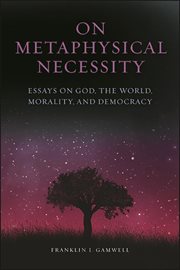Nonfiction
eBook
Details
PUBLISHED
Made available through hoopla
DESCRIPTION
1 online resource
ISBN/ISSN
LANGUAGE
NOTES
Emphasizes the importance of metaphysical necessity to both philosophical theology and, through it, to moral and political theory. In this collection of essays, Franklin I. Gamwell offers a defense of transcendental metaphysics, especially in its neoclassical form, and builds a case for its importance as a tool for addressing abiding problems in philosophical theology and morality-including talk about God, human fault, moral decision, and the relationship of politics and religious freedom. In Part I, Gamwell argues against Kant and a wide range of contemporary philosophers, for the validity of transcendental metaphysics designated in the strict sense. He engages with Aquinas, Schleiermacher, Augustine, and Reinhold Niebuhr to argue that neoclassical metaphysics, for which the divine whole is itself temporal or forever self-surpassing, provides a more coherent account of God than does classical metaphysics, for which the divine whole is completely eternal. In Part II, Gamwell looks at transcendental metaphysics designated in the broad sense. In particular, he takes up the moral opportunity with which humans are presented, and argues that the moral law depends on a comprehensive good, that is, a good defined metaphysically in the strict sense. He then offers an extended discussion of the relation between transcendental metaphysics and morality, and explores Ronald Dworkin's view of the relationship between democracy and religion, the question of whether religious activities are properly exempted from generally applicable laws, and the constitutional debate about national and states' rights
Mode of access: World Wide Web







